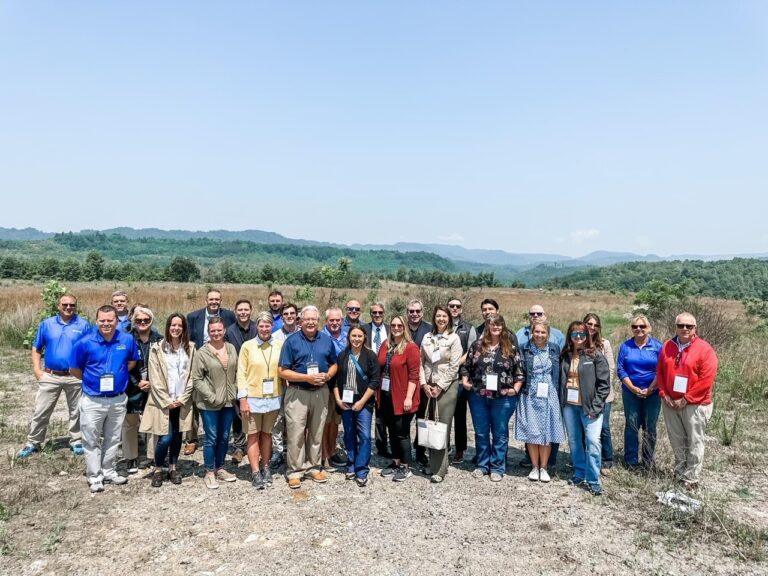
On June 7-9, 2023, 18 local and regional leaders from coal communities across the nation convened in the Southwest Virginia (SWVA) region for a peer-learning journey. This Coalition was launched through the Building Resilient Economies in Coal Communities (BRECC) Community of Practice initiative, supported by the U.S. Economic Development Administration (EDA) and led by the National Association of Counties (NACo). This was the first of four peer-learning site visits planned for the Coalition over the next two years to provide a platform for coal community leaders to learn and share strategies for economic diversification, resilience, and revitalization. Will Payne, Director of InvestSWVA, is a Coalition member and served as host for this first interactive visit.

The Southwest Virginia region is located in the Appalachian Mountains where the far southwest tip of Virginia meets Tennessee, Kentucky, West Virginia, and North Carolina. The rural region has faced economic challenges due to the decline in the coal economy, coupled with declines in tobacco, textiles, and manufacturing. However, SWVA has embarked on a collaborative, regional approach to economic diversification which has sparked success and momentum across a variety of future-forward development projects that were showcased to the national cohort.
Driving collaboration into action and implementing this regional vision in the SWVA coalfields are a collection of innovative entities, including: InvestSWVA, a regional public-private business attraction and marketing entity; LENOWISCO Planning District Commission (PDC), the region’s Economic Development District (EDD); and the Lonesome Pine Regional Industrial Facilities Authority(LP RIFA), a unique partnership created to pool resources and share development revenues across four counties and one city and administered by LENOWISCO PDC.
Reclamation and redevelopment of previously coal mined land has been a major strategy for the region and the peer-exchange showcased project sites in Wise County and the City of Norton, each in different phases of development and targeting different focus areas of investment.
New Energy Technology
Business Park Development
Agriculture/Specialty Grains

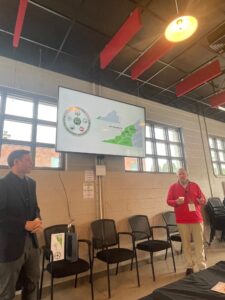
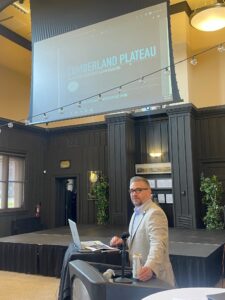
Essential funding partners in making these projects come to life have been the U.S. EDA; the Office of Surface Mining’s Abandoned Mine Land Economic Revitalization (AMLER) program; state funding partners such as Virginia Energy, GOVirginia, and the Virginia Tobacco Commission; and myriad other federal, local, and private partner funds.
The Coalition also learned about more ongoing regional economic diversification efforts including workforce partnerships with community colleges, telework opportunities, downtown revitalization projects, and tourism initiatives. Tourism initiatives were on full display at the event opening reception at the Birthplace of Country Music Museum in Bristol, while collaborative efforts across 19 counties and five EDDs in advancing tourism and the creative and recreation economy were featured in a panel discussion.


“A community’s economic issues don’t always stop at the city or county border. As regional EDD staff, we are focused on issues that can be addressed or solved on a regional basis, ensuring a ‘rising tide raises all ships’. At Six County AOG, we continue to push for strategic regional thinking, with long-term objectives that will become legacy projects and secure the future of the region.
Closures (coal mining and plants) are a regional issue when you take into account employees traveling across our counties for work, but also the supporting businesses (i.e trucking, machinists) located across the region. Collaborating with other coal communities from across the nation helps generate ideas that can be adapted to our region.
The #1 takeaway from the SWVA visit is the creation of the Regional Industrial Facilities Authority (RIFA) and how that can be implemented in our region. Learning that projects in the region can be governed under the same board instead of having silo projects has made me want to pivot the way we are structuring projects, such as a large, agricultural processing industrial park we are developing.”

“I was so impressed with SWVA’s efforts. They have demonstrated what working together can accomplish. They engaged an ‘outside the box’ approach to enhancing what they had to work with, such as embracing former mining areas as a benefit rather than liability and inspiring approach to agriculture and specialty crops. One statement I am continually reminded of is ‘We didn’t wait on Richmond (state government) to give us permission.’ They worked with each other to develop what was best for them.
Green River ADD is the unifying force in building a resilient economy for our region. I feel honored to bring back these resources not only to Webster County, but to Western Kentucky. BRECC provides a unique opportunity to collaborate and counsel with similar communities… it’s an outstanding network for me to tap into.”
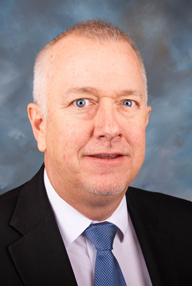
Duane Miller said the biggest takeaway he had from the event was how impressed others were by the widespread regional cooperation and partnerships that are taking place in Southwest Virginia.
“We had people from all over the U.S. come to visit our region. It was a great opportunity for us to learn from them and I think they learned a lot from us, too.”
“Bring energy, work hard, and like each other.”
Mr. Miller offered to the group this mantra in referencing tips of the trade in building regional relationships and buy-in among local governments and other key partners. As noted in response from both the visiting cohort and SWVA hosts alike, in a land of historic Friday Night football rivals, this seemingly simple statement has a powerful impact.

Scotty Wampler joined the Coalition visit in SWVA to share the EDD’s plans for economic resilience through infrastructure and asset-based development efforts. Cumberland Plateau PDC is the neighboring EDD to LENOWISCO in the SWVA coalfields. As an EDD, Cumberland Plateau PDC has made economic diversification a foundational pillar of its work. Conjuring up images of inspirational signs in sports locker rooms, Mr. Wampler summarized that his guiding ‘north star’ is quality-of-life for the region, while also being committed to ensuring small businesses and entrepreneurs are able to plug into new opportunities in asset-based economic development investments.
“If we don’t have quality-of-life, then we don’t have economic development.”
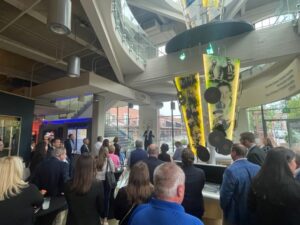


To learn more about this site visit in SWVA, please reference the below media stories:
The NADO Research Foundation (NADO RF) and NACo have been long-time partners in supporting coal-reliant communities across the country through training, research, and peer exchange. Currently, NADO RF serves on the BRECC Advisory Council as part of its Economic Development District Community of Practice (EDD CoP), a multi-year effort to build capacity across the national network of EDDs.
To learn more about BRECC and future programming, such as its virtual webinar series, visit the Building Resilient Economies in Coal Communities page of NACo’s website.
 The EDD CoP is funded through an award from the U.S. Economic Development Administration, U.S. Department of Commerce (ED22HDQ3070106). The statements, findings, conclusions, and recommendations above are those of the participants, trainers, and authors and do not necessarily reflect the views of the U.S. Economic Development Administration or the U.S. Department of Commerce.
The EDD CoP is funded through an award from the U.S. Economic Development Administration, U.S. Department of Commerce (ED22HDQ3070106). The statements, findings, conclusions, and recommendations above are those of the participants, trainers, and authors and do not necessarily reflect the views of the U.S. Economic Development Administration or the U.S. Department of Commerce.
© 2022 National Association of Development Organizations (NADO) and the NADO Research Foundation. All Rights Reserved.
Regional Development Researcher Andrew Coker joined the NADO team in March of 2023 after spending two and a half years as the Regional Economic Resiliency Coordinator at West Central Arkansas Planning and Development District. Andrew holds a bachelor’s degree from Hendrix College and a master’s degree from the University of Arkansas Clinton School of Public Service.
At NADO, Andrew conducts research on the newest economic and community development best practices from Economic Development Districts across the country. He helps produce easily digestible information on complex regional issues through case studies, tip sheets, and research reports. Andrew also hosts training and professional development opportunities including conference sessions and virtual webinars for member regional development organizations.
Andrew is one of our Missouri-based team members and enjoys reading and training for his next triathlon.
Jack Morgan came to the NADO team in 2022 after seven years with the National Association of Counties (NACo) as a Program and Senior Program Manager. Prior to NACo, Jack was a Policy Analyst for Friends of Southwest Virginia. Jack holds a bachelor’s in geography from Emory & Henry College and a master’s in geography from Appalachian State University.
As a NADO Senior Program Manager, Jack leads capacity-building and peer-learning work supporting energy communities in economic transition, regional resilience, and recreation economies. He also helps with the EDA-Austin training program Emerging Leaders.
Jack is certified by the American Institute of Certified Planners (AICP) and is a member of the American Planning Association (APA) in the Regional & Intergovernmental Planning division. He also serves on the Emory & Henry College Alumni Board.
Taking road trips, reading non-fiction, and indulging in top-notch barbecue and coffee round out Jack’s days. He loves maps, mountains, and of course, all things sports.
Karron Grant joined the NADO team in 2023 as Administrative Specialist and is the first face (or voice) you’ll see or hear when reaching out to NADO. As Administrative Specialist, Karron manages our database and coordinates NADO event operations. He ensures members’ needs are met, contact information stays current, and NADO’s office is running efficiently.
Karron came to NADO after four years in the classroom teaching at The New Century School and Old Mill Middle North where he received the Patriot of the Year award. He attended Towson University and the University of Maryland Global Campus and holds a bachelor’s in international studies and humanities.
Visiting art galleries and museums, playing basketball and bowling, and taking in movies and music are some of Karron’s interests and hobbies.
Deputy Executive Director Laurie Thompson has been with NADO for 25 years. Laurie helps keep the NADO and NADO Research Foundation wheels turning through management of the daily operations of the Research Foundation, securing financial resources and overseeing grants management, and helping execute NADO’s Annual Training Conference each year.
Laurie holds a bachelor’s in public affairs and government from Mount Vernon College and a master’s in health services administration from The George Washington University. Prior to NADO, Laurie spent time as a Field Specialist and an Eagle Staff Fund Director at First Nations Development Institute.
When she’s taking a rare reprieve from her NADO work, Laurie enjoys traveling domestically and internationally to visit friends and family.
Jamie McCormick joined the NADO team as a Policy Fellow first in 2019, then moved into her current role as Legislative Associate in 2021. As Legislative Associate, Jamie keeps NADO members apprised of any policy and regulatory issues and communicates NADO’s policy priorities to federal stakeholders and partner organizations. She is also the first stop for members with inquiries on policy issues. The planning and execution of NADO & DDAA’s annual Washington Conference is also managed by Jamie.
Jamie holds a dual bachelor’s in political science and international relations from The State University of New York College at Geneseo and a master’s in international development studies from The George Washington University. In addition to her roles at NADO, Jamie also worked as a Legislative Assistant for the Northeastern Retail Lumber Association.
Outside of her NADO work, Jamie is an active volunteer with the VOLO Kids Foundation and a fundraiser for YMCA youth programs. She is also NADO’s resident baker regularly providing treats for those in NADO’s D.C. office. Traveling, taking her pup on walks, and hiking in the northeast keep Jamie busy.
Brett Schwartz began at NADO in 2012 as a Research Fellow after earning his J.D. from the University of Baltimore School of Law. The following year, he was promoted to Program Manager and has now been leading as an Associate Director since 2018. Brett is responsible for managing NADO’s Economic Development District Community of Practice (EDD CoP), as well as researching and monitoring the latest trends in regional economic development and resilience, including best practices for the Comprehensive Economic Development Strategy (CEDS). With more than a decade of experience on the NADO team, Brett is a dynamic relationship builder helping connect and build capacity among the national network of regional development organizations.
Brett also holds a bachelor’s degree from Georgetown University and a master’s from Trinity College Dublin, as well as a certificate in mediation training. He’s a member of Catalyst Grantmakers of San Diego and Imperial Counties and was a participant in the 2021-22 Field Trips to the Future Cohort.
Brett is one of NADO’s West Coast team members residing in San Diego, CA where he enjoys spending time outdoors, attending concerts and festivals, and soaking up life as a parent of two young children.
Communications Manager Katie Allison joined the team in 2023 to lead the strategic communication efforts of NADO. Katie creates and develops print and online materials, communicates NADO’s updates to members via weekly emails, and maintains content for nado.org and NADO’s social media channels. She also works with different departments to generate new ideas and strategies to effectively describe and promote the important work NADO is doing for EDDs and RDOs across the country.
An experienced nonprofit communications professional, Katie has worked for organizations in western North Carolina for nearly a decade. She holds a bachelor’s in communications from Wingate University where she was a four-year student athlete. Katie has also completed Vision Henderson County, a comprehensive leadership development program that promotes informed and committed civic volunteerism.
Katie stays busy trying to keep up with her two young sons whom she enjoys exploring the Blue Ridge Mountains with. Traveling to new and favorite places and cheering on the Atlanta Braves are some of her family’s favorite pastimes.
Senior Program Manager Ciara Ristig has been a member of the NADO team since 2021, and helps with NADO’s EDD Community of Practice, EDD staff capacity building and other grants on a range of subjects, including equity and solar energy. Before NADO, Ciara worked as a Planner for the County of Santa Barbara and an Assistant Project Manager for REM Consult. Ciara holds a bachelor’s in urban studies and French from Bryn Mawr and a master’s in urban studies from Ecole d’Urbanisme de Paris.
When she’s not traveling, you can find her outrigger paddling and serving on the board of the Blue Sky Center in New Cuyama, CA, near her home base of Santa Barbara.
Carrie Kissel has been a member of the NADO team since 2005 when she began as a Research Fellow. She later moved into the roles of Program Manager in 2006, and then Associate Director in 2011. Carrie holds a bachelor’s in anthropology from Ball State University and a master’s in public anthropology from American University. As Associate Director, Carrie oversees NADO’s work in rural transportation and rural wealth creation. She provides technical assistance and support to rural regions on transportation and economic development issues and develops training and peer exchange events on transportation issues and rural wealth creation as an economic development strategy.
Carrie is a member of the Transportation Research Board (TRB) and secretary of TRB’s Rural Transportation Issues Coordinating Council. She is also a member of the American Anthropological Association and the National Association for the Practice of Anthropology.
Reading, gardening, hiking, and kayaking are a few of Carrie’s hobbies, and she organizes and facilitates a DEI/social justice-focused book club in her community.
Melissa Levy has worked at NADO as a Regional Development Researcher since February 2023 and is the Principal Consultant at her own firm specializing in wealth-based economic development consulting. With a career spanning nearly 30 years, Melissa brings a breadth of knowledge to her role as a Regional Development Researcher. Melissa provides in-depth research, coaching, and training on regional economic resilience, rural wealth creation strategies, and economic development.
Melissa is a North American Food Systems Network trained AgriCluster Resilience and Expansion (ACRE) facilitator and a WealthWorks coach, facilitator, and trainer. In addition to her professional work, Melissa serves on the Vermont Urban and Community Forestry Council, on the board of the Hinesburg Community Resource Center, and on the Hinesburg Economic Development Committee.
A true outdoorswoman, Melissa enjoys cross country and downhill skiing, paddleboarding, hiking, biking, and kayaking, as well as yoga, and teaching Tai Chi.
Program Manager Krishna Kunapareddy began her role with NADO in February of 2023 after 14 years of service at Boonslick Regional Planning Commission in Missouri. Krishna manages NADO Research Foundation’s Planning and Environmental Linkages and Center for Environmental Excellence projects. In addition to researching and writing, Krishna also conducts virtual workshops on innovative tools and techniques related to transportation planning.
She holds an undergraduate degree from Andhra University and a master’s from JNT University in India, as well as a master’s in city and regional planning from the University of Texas at Arlington. Krishna is also a certified Smart Cities Academy Practitioner and holds the Location Advantage certificate from geographic information system software company ESRI.
In her spare time, Krishna volunteers with Mentors4College helping high schoolers better plan for their post-high school paths. She is also a dedicated advocate for documented H4 Dreamers.
Krystal DeLeon joined the NADO team in October of 2020 as Database & Grants Manger, but in January of 2022 transitioned to her current role as Operations Manager. Krystal keeps NADO running through behind the scenes work of invoicing, solving any database issues that may arise, producing membership reports, and much more. Her organizational skills and thorough knowledge help the NADO team operate more efficiently across all departments.
Prior to NADO, Krystal was the Conference Services Coordinator for State Services Organization. She is a Certified Meeting Professional (CMP), a licensed realtor, and holds a bachelor’s in psychology from Liberty University. When she’s not keeping NADO’s operations in order, Krystal enjoys running and rock climbing, and adventuring with her husband and son.
Senior Program Manager Bret Allphin joined NADO in April of 2022 bringing with him a wealth of knowledge after a 20-year career with Buckeye Hills Regional Council in Marietta, Ohio. In addition to his bachelor’s in political science and master’s in public affairs, Bret is licensed Geographical Information Systems Professional (GISP). He is NADO’s go-to team member for all things mapping while also supporting members with transportation and economic development technical assistance services.
An avid sports aficionado and former collegiate athlete, Bret enjoys cheering on his Cincinnati Reds, hitting the trails on his mountain bike, and improving his golf game whenever possible. Bret is an involved community member in Marietta dedicating much of his spare time to serving on local nonprofit boards.

Applications cannot be saved and returned to at a later time. It is recommended you compile all of your information in advance in a word processor and cut and paste into the application below.
Joe McKinney serves as Executive Director of the National Association of Development Organizations (NADO). Headquartered in Washington DC, NADO provides advocacy, education, research, and training for the nation’s 500+ regional planning and development organizations.
Joe has thirty-one years of experience having served in city, county, regional, national association, and government management since 1991. He holds a bachelor’s degree in Public Policy Analysis from the University of North Carolina at Chapel Hill and is a candidate for a master’s degree in Public Administration from UNC-Chapel Hill.
McKinney has provided congressional testimony on numerous occasions regarding the importance of regional development organizations in helping shape the nation’s economic growth. He is nationally recognized for promoting innovative solutions in areas such as planning and economic development, workforce development, transportation and transit, and aging services.